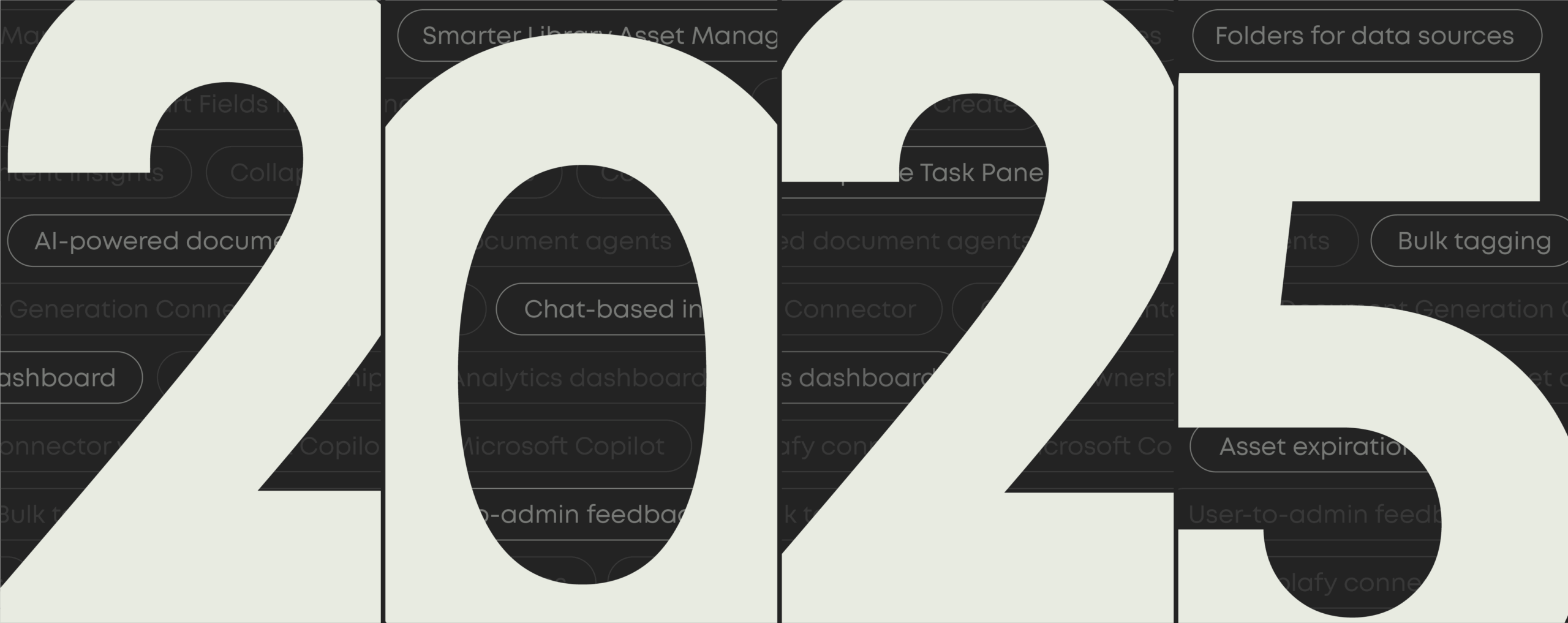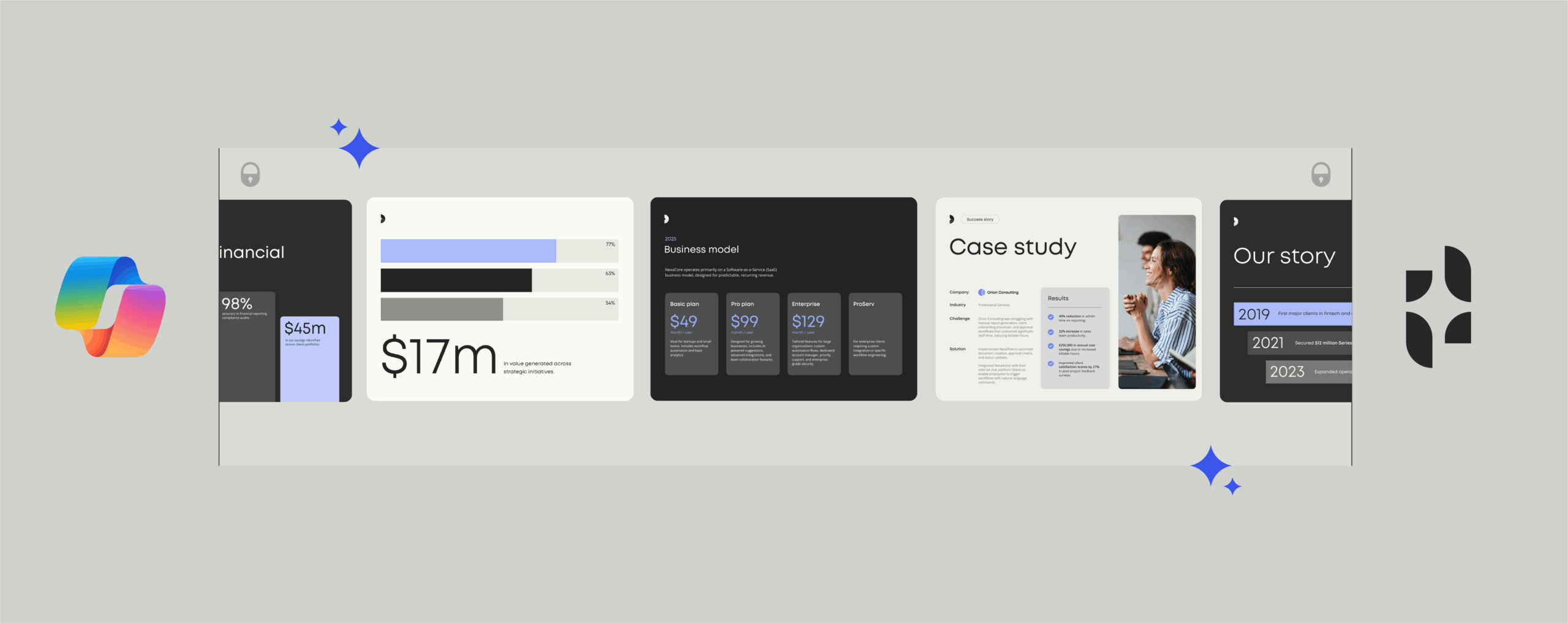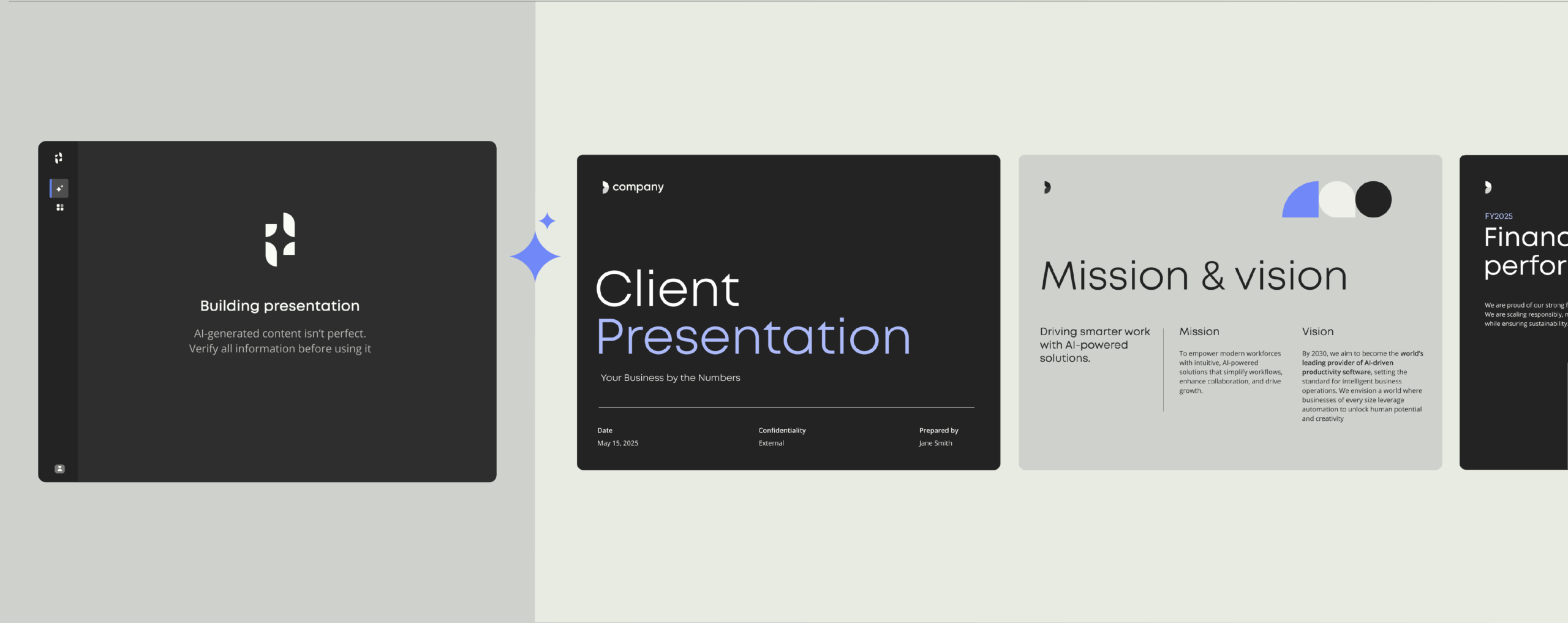7 high-ROI use cases for AI in B2B sales

How to speed up the sales cycle and protect your brand
Sales may be one of the oldest professions—but modern selling is anything but old-fashioned.
The role has expanded far beyond closing deals. Today’s sales teams juggle dozens of time-consuming tasks across the funnel: prospecting, follow-ups, proposals, contracts. And at every stage, there’s now an AI tool promising to do it faster, smarter, and with less lift from your team.
But with so many tools on the table, how do you know which ones are actually worth your investment?
Whether you’re chasing better leads or creating client-ready proposals without the back-and-forth, this blog breaks down how to choose AI tools that scale with your workflow and deliver results you can actually measure.
The AI in sales stats your CRO should know
- 78% of sales professionals report improved prospecting outcomes thanks to GenAI (Gartner, 2024)
- 83% of sales teams utilizing AI experienced revenue growth, compared to 66% of teams not using AI (Salesforce)
- 92% of executives plan to increase AI investment over the next three years (McKinsey)
- By 2027, 95% of seller research workflows will begin with AI (Gartner)
- Companies using AI tools in sales increased lead generation by 50% (Ringover)
What to look for in an AI sales tool
In high-stakes enterprise sales, the wrong AI tool doesn’t just slow you down—it puts deals, data, and your brand at risk. Inaccurate or generic outputs can damage credibility. Poor integrations add friction. And tools that go unused become wasted spend.
To see real value from AI, you need tools that can scale with your team, protect your brand, and deliver consistent, measurable outcomes.
Here’s what to look for:
- Scalability: Can it handle real enterprise pressure? The best tools support large, distributed teams without breaking under the weight of thousands of users, or complex deal structures.
- Enterprise-grade security: Encryption, audit trails, role-based access, and compliance support are must-haves—especially when AI tools are generating content from customer or financial data.
- Native integrations: Tools should work where your sellers work: inside familiar apps and integrated with your CRM and DAM systems and communication stack. No more app-switching or copy-pasting between platforms.
- Governed customization: AI needs guardrails. The best platforms let you embed brand voice, formatting rules, and approval flows, so reps can move fast without going off-brand.
- Proven impact: Look for tools with results—customer benchmarks, case studies, and usage data should show measurable gains.
- User-first design: No matter how powerful the engine, it’s worthless if reps don’t use it. Adoption comes from tools that are intuitive, responsive, and embedded in daily workflows.
Where AI delivers the biggest wins in sales
AI can be woven into every part of the sales cycle, but not every use case delivers the same level of value. The strongest returns come from areas where AI helps reduce wasted effort, increase personalization, and deliver insight at scale.
Here, we’ve gathered the most impactful use cases for tools powered by AI.
AI
7 use cases for tools powered by AI
- Sales content generation and document automation
- Lead scoring and qualification
- Personalized outreach and engagement
- Forecasting and pipeline accuracy
- Conversation intelligence and coaching
- Buyer insights and guided selling
- Conversational AI and autonomous selling
Keep up with AI
Get practical tips and real stories on how AI is changing document work. Stay informed and make smarter choices for your team.
1. Sales content generation and document automation
Creating sales documents is still one of the most time-consuming parts of the job. Whether it’s a pitch deck, proposal, or one-pager, reps often spend hours formatting slides, chasing approvals, or searching for the latest brand assets.
A strong AI-powered document tool can help teams build polished, on-brand content in minutes—not hours—by pulling from pre-approved libraries and applying company-wide rules for brand, tone, and compliance.
The result is faster turnaround, fewer revisions, and less pressure on sales, marketing, and legal teams. Reps spend less time wrestling with templates and more time selling.
2. Lead scoring and qualification
This is one of the earliest and most adopted applications of AI in sales—and for good reason. Predictive scoring tools analyze a wide array of buyer signals (web activity, company firmographics, CRM history) to determine which leads are most likely to convert.
According to Salesforce, high-performing sales teams are 2.3x more likely to use AI for lead prioritization. (Salesforce)
3. Personalized outreach and engagement
Generic outreach is easy to ignore. Today’s buyers expect relevance, and AI can help sales teams deliver it at scale. Modern AI tools can analyze behaviour, persona traits, and real-time intent signals to tailor messaging that actually resonates. That means reps spend less time drafting emails and more time engaging prospects with content that feels timely and targeted.
4. Forecasting and pipeline accuracy
Forecasting is a high-stakes challenge in sales—and one of the hardest to get right. Traditional methods rely on manual updates, biased inputs, and spreadsheets that quickly become outdated.
Tools like revenue intelligence platforms use machine learning to analyze historical trends, deal engagement, and rep behavior to flag what’s likely to close, what’s at risk, and where to focus next. For enterprise sales leaders, that means fewer surprises, tighter execution, and more reliable quota attainment.
Instead of guessing, these AI-powered tools give you a clear-eyed, data-supported view of your pipeline.
5. Conversation intelligence and coaching
Great sales performance is rarely down to luck. It comes from repeatable behaviours, like how reps open calls, handle objections, and tailor value propositions.
Conversation intelligence tools use AI to analyze sales calls at scale, surfacing insights on talk time, tone, sentiment, objection handling, and more. These tools help sales leaders understand what top performers are doing differently and turn those insights into coaching strategies that lift the entire team.
6. Buyer insights and guided selling
Even skilled sales reps can miss important signals during the sales process. A stakeholder might suddenly go quiet, engagement levels could drop, or an important decision-maker might remain unnoticed. AI-powered guided selling tools help catch these subtle cues. By analyzing your CRM data, call recordings, and customer behavior patterns, these tools can identify potential risks before they derail deals. They then provide specific suggestions on what actions to take next, keeping your sales process moving forward with clear direction.
7. Conversational AI and autonomous selling
Following up consistently is a challenge—especially when reps are chasing multiple deals across overflowing inboxes. Conversational AI takes the pressure off by autonomously engaging leads, qualifying prospects, and routing high-intent opportunities to sales.
These tools simulate real conversations over chat or email, keeping momentum going even when human teams are stretched thin. They scale outreach, speed up response times, and keep the pipeline moving without extra headcount.
ADDITIONAL CONTENT
Embed AI where it matters most—your documents
Discover how Templafy’s document agents work inside Word, PowerPoint, Excel, and Copilot to keep every document accurate, compliant, and on-brand.
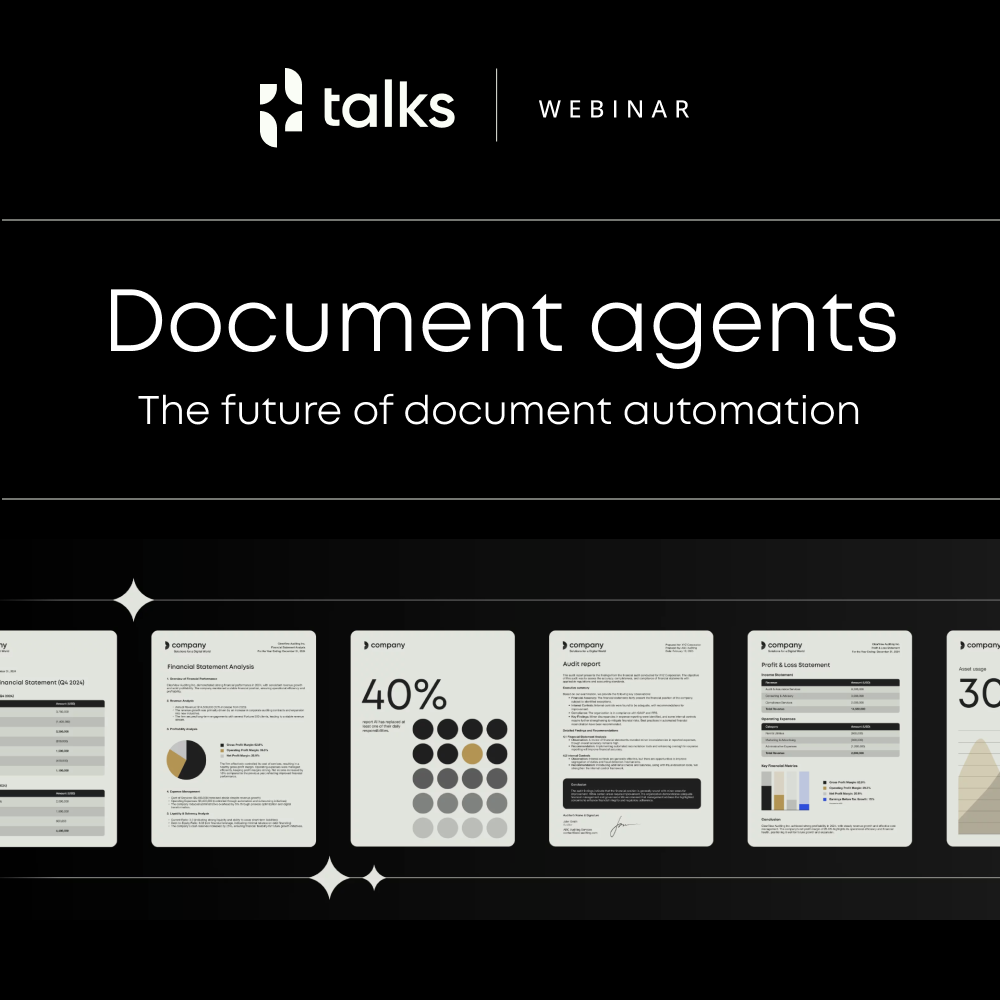
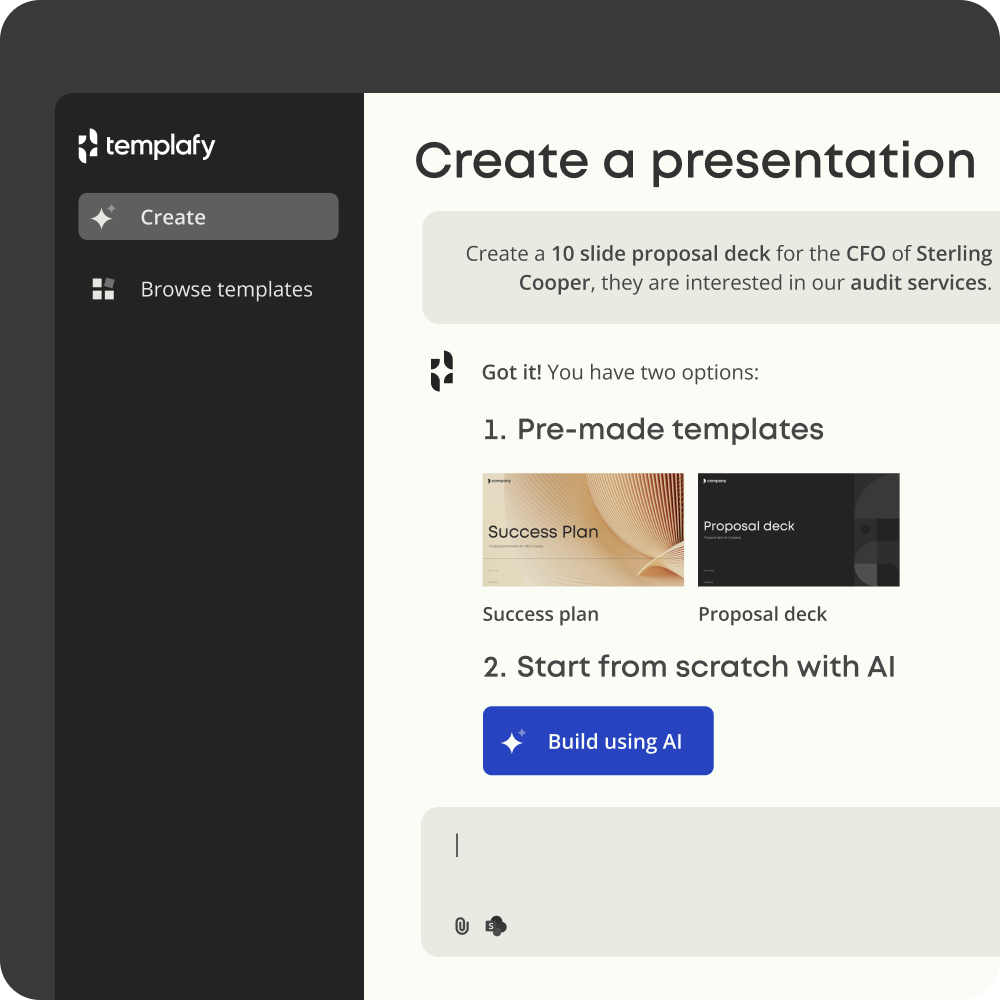
Why sales documents are the smartest place to invest in AI
If you want AI to deliver real value in sales, use it where teams waste the most time: document creation.
In B2B sales, your documents are your product. Whether it’s proposals, pitch decks, engagement letters, or audit reports, these materials speak for you. By making document creation faster, more accurate, and consistent, you unlock more time for what matters: building relationships, creating value, and making the buying process smoother.
In fact, businesses adopting AI-powered automation solutions reported an annual revenue increase 6 to 10%, due to enhanced efficiency and shorter sales cycles. (Metasource)
The problem with manual document workflows:
- Enterprises lose $12.9M annually due to poor content and data quality (Gartner)
- Manual errors increase the risk of compliance breaches by 2.7x (Ponemon Institute)
- 50% of knowledge workers’ time is spent on document tasks (The ECM Consultant)
All of this is why document automation is the best place to focus your AI investment. It’s high-volume, high-impact, and delivers measurable results from day one.
How Templafy’s AI-powered documents boost conversions
There’s a reason global companies like KPMG, EY, and more than four million users rely on Templafy to create business documents. When your sales performance and brand reputation are on the line, you need documents that deliver—fast, accurate, and always compliant.
Templafy is the AI-powered document generation platform built for enterprises that rely on documents. With Templafy, teams can generate sales materials at speed, without compromising on content quality, accuracy, or brand integrity. And because it works inside the tools reps already use, like Word, PowerPoint, and SharePoint, there’s no need to switch platforms or learn new software.
How Templafy works:
- Centralized control: No more scattered templates or off-brand slides. Templafy gives every seller access to a single source of truth—so proposals, pitch decks, and follow-ups are always consistent and compliant.
- Speed without shortcuts: Templafy blends rule-based logic with GenAI to help sales teams create polished documents in minutes. Fast turnaround, without losing accuracy or brand voice.
- Built-in compliance: With SOC 2, SOC 3, and ISO 27001 built in, every document is audit-ready. Reps can customize content without risking legal, regulatory, or brand missteps.
- AI-powered document agents: Templafy’s newest innovation brings intelligent help directly to Microsoft 365. These AI agents let you create documents through a simple chat interface. Just chat about what you need, and they’ll pullthe right copy, apply brand rules, and handle formatting automatically—making document creation faster and easier than ever.
With Templafy:
- 92% faster proposal cycles
- 30% fewer document errors
- 3 to 4 hours saved per employee, per week
Based on our customer cases.
case study
How IComm boosted win rates with faster proposals
“Templafy has freed up our sales team to do more live presentations, which has a direct impact on our win rate.” – James Bruce, Senior Pre-sales Architect, IComm
IComm, a leading IT consultancy, faced time-consuming proposal creation and inconsistent templates. Templafy transformed their workflow, leading to:
- Reduction in proposal creation time from 3 to 4 weeks to 20 minutes
- Rise in win rates from 66% to over 75%
- Up-to-date and on-brand proposals, every time
case study
How Material+ cut presentation time by 50%
“The fastest I could create a solid PowerPoint for a client was five days. Now it’s cut in half.” – Alex Steging, VP/GM, Insights, Material+
Material+, a global market research firm, needed to organize content and speed up client delivery. With Templafy:
- Presentation creation dropped from 5 days to 2.5 days
- New employees onboarded faster
- Access to accurate, professional content became instant
Ready to speed up your sales cycle—without sacrificing control?
Templafy gives reps the power to create client-ready documents in minutes, all from inside their everyday apps, like Word, PowerPoint, and SharePoint.
The best way to find out how Templafy’s platform and AI-powered document agents can quickly deliver on-brand, compliant, and high-quality sales documents is to see it in action. Book a demo today.

